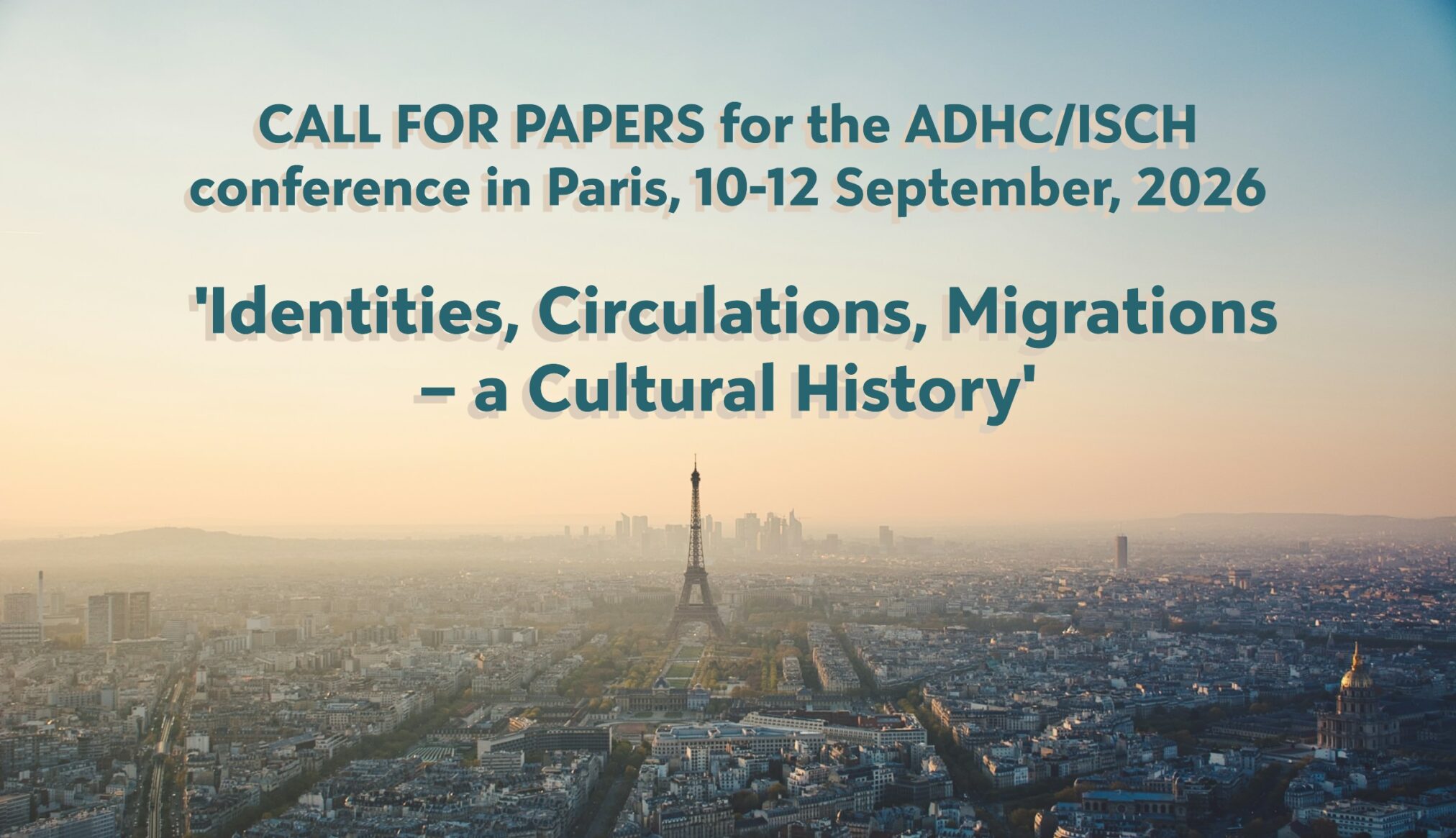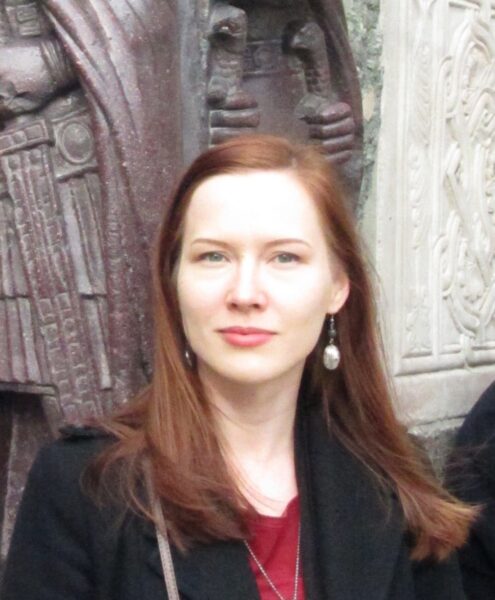Call for papers
International Congress of the Association for the Development of Cultural History and the International Society for Cultural History
Paris, September 10–12, 2026
The theme of the 2026 ADHC and ISCH joint annual congress in Paris/Aubervilliers is:
Identities, Circulations, Migrations – a Cultural History.
Based on the observation that all societies have been shaped by the movement of human beings, ideas and beliefs, goods and capital, the organizers wish to build an international scientific meeting around this central theme. More specifically, they wish to examine the relationship between these movements (particularly those of all individuals who physically cross state borders) and identities, at all levels that deserve to be considered: identities of the people who move as well as those of the host and home countries, local, national, international and transnational, and even civilizational identities. We welcome proposals about all historical periods, in comparative approaches across regions and times, as well as about the contemporary period (19th-21st centuries). We also welcome proposals on epistemologies, theories, and methodologies of cultural-historical research with reference to any aspect of cultural history.
A large number of books on the theme of identity, whether or not the expression appears in their title, have appeared in recent years. Polemic essays, scientific studies, novels, plays, films, and more recently web-related productions, have seized upon a polysemic and polemic notion for which there are several possible definitions. If we define identity as a system of representations of the self and others through which a certain form of recognition by the group and permanence over time is constructed, this editorial effervescence could well be evidence of a crisis, or at the very least of a questioning of the traditional methods of identification and the institutions that support them. This crisis affects the entire Western world and is detectable globally. It can take on different forms depending on the country and culture, which do not all give the same meaning to the concept of identity. Salman Rushdie pointed out that in India, “identity” tends to mean religious identity, “at the heart of the Hindu nationalist attempt to reinvent the idea of India in purely Hindu terms, excluding members of all other religions”. In the United States, it is questions of racial and sexual identity that dominate the debate. In Europe, there is more concern about defending national identities, supposedly threatened by uncontrolled immigration or by Brussels bureaucracy. These concerns are exploited by hate mongers of all stripes who manipulate fantasies or nostalgia for a closed, pure, fixed identity. That is why a scientific and historical, international and transnational reflection on questions of identity and their links with movements and mobilities of all kinds seems expedient and even urgent.
Proposals are welcome on (but not limited to) the following topics:
- historical approaches to how cultures, groups, and periods select and around characteristics perceived as common.
- the construction, development, or end of systems of identity representation.
- discourses and struggles of representation.
- practices and practical modalities of identity belonging.
- phenomena of socialization, exclusion and marginalization of groups.
- historical and contemporary mobility and fluidity.
- identity conflicts and the paroxysmal moments of ‘identity fever.’
- history of institutions and public policies dealing with issues related to migration phenomena (language policies, immigration museums, etc.).
- history of institutions, public policies, and phenomena centered on any forms of identity (religious, regional, national, ethnic, gender, race, etc.).
- intersectionality and any forms of identity throughout history to the present.
- theories, and methodologies of research regarding any aspect of cultural history.
Please send proposals for individual papers and panels, in PDF format of no more than two pages (600-700 words in 12-font Times New Roman, double-spaced), in French or English, to this address by January 20, 2026:
adhc.isch2026@gmail.com
Proposals will be evaluated by a scientific committee. Participants will be notified in early March 2026. To attend the conference, participants have to be members of the ADHC or the ISCH and to have paid their membership fees in full.
ADHC address: https://adhc.hypotheses.org/ and Revue d’histoire culturelle, XVIIIe-XXIe siècles: https://journals.openedition.org/rhc/
ISCH address: http://www.culthist.net/ and ISCH-Journal: http://www.euppublishing.com/loi/cult
You can download the CfP as a PDF file from this link.
Appel à communication
Congrès international Association pour le développement de l’histoire culturelle / International Society for Cultural History
Paris, 10-12 septembre 2026
En 2026, les associations ADHC et ISCH tiendront ensemble à Paris/Aubervilliers leur congrès annuel. Le thème choisi pour cette rencontre est le suivant :
Identités, circulations, migrations – une histoire culturelle.
Partant du constat que toutes les sociétés ont été façonnées par les circulations d’être humains, d’idées et de croyances, de biens et de capitaux, les organisateurs souhaitent construire une rencontre scientifique internationale autour de ce thème central. Ils souhaitent plus particulièrement interroger le rapport entre ces circulations (et notamment celles de toutes celles et de tous ceux qui traversent physiquement les frontières étatiques) et les identités, à toutes les échelles qui méritent d’être considérées : identités des personnes qui se déplacent comme celles des pays d’accueil et d’origine, identités locales, nationales, internationales et transnationales, voire civilisationnelles. Toutes les périodes historiques peuvent faire l’objet d’une proposition, même si le centre de gravité du congrès se situera à l’époque contemporaine (XIXe-XXIe siècles). Des propositions d’ordre méthodologique et épistémologique plus générales sont également les bienvenues.
Un grand nombre d’ouvrages portant sur le thème de l’identité, que l’expression figure dans leur titre ou non, ont paru ces dernières années. Essais polémiques, études scientifiques, romans, pièces de théâtre, films, plus récemment productions liées au web, se sont emparé d’une notion polysémique et polémique dont il existe plusieurs définitions possibles. Si l’on définit a minima l’identité comme un système de représentations de soi et des autres par lequel est construite une certaine forme de reconnaissance par le groupe et de permanence dans le temps, cette effervescence éditoriale pourrait bien témoigner d’une crise de ce système, à tout le moins d’une remise en cause des modalités classiques de l’identification et des institutions qui en sont les supports. Cette crise touche l’ensemble du monde occidental et sans doute au-delà. Elle peut prendre différents visages selon les pays et les cultures, qui ne donnent pas tous le même sens à la notion d’identité. Salman Rushdie rappelait qu’en Inde, on entend par « identité » plutôt l’identité religieuse, « au cœur de la tentative nationaliste hindoue de réinventer l’idée de l’Inde en termes purement hindous, en excluant les membres de toutes les autres religions ». Aux États-Unis, ce sont les questions d’identité raciale et sexuelle qui dominent le débat. En Europe, on s’inquiète plutôt de la défense des identités nationales, supposément menacées par l’immigration incontrôlée ou par la bureaucratie bruxelloise. Ces inquiétudes sont exploitées par des entrepreneurs de haine de tous bords qui manipulent les fantasmes ou la nostalgie d’une identité close, pure, figée. C’est pourquoi une réflexion posée, scientifique et historique, internationale et transnationale, sur cette question et sur le lien avec les circulations de tous types apparaît opportune et même urgente.
Afin d’aborder les diverses manières de se rassembler autour de caractéristiques perçues comme communes, l’approche historienne privilégiera les argumentations attachées à la construction, le développement, voire la fin de ces systèmes de représentation identitaires. Au-delà de l’analyse des discours et des luttes de représentation, l’attention pourra être portée sur les différentes modalités pratiques d’appartenance identitaire, sur les phénomènes de socialisation, d’exclusion et de marginalisation de groupes, sur les conflits et les moments paroxystiques de fièvre identitaire, ainsi que sur l’histoire des institutions et politiques publiques prenant en charge les questions liées aux phénomènes migratoires (politique linguistique, musées de l’immigration, etc.)
Les propositions de communications, en format pdf de deux pages au maximum (600 à 700 mots en police Times New Roman, caractère 12, double espacement), en français et en anglais, seront à envoyer à cette adresse avant le 20 janvier 2026 :
Elles seront évaluées par un comité scientifique entre cette date et le 1er mars 2026. Les inscriptions pour le congrès seront ouvertes à partir du 1er mars.
adresse ADHC: https://adhc.hypotheses.org/ et Revue d’histoire culturelle, XVIIIe-XXIe siècles: https://journals.openedition.org/rhc/





 Anna-Leena Perämäki
Anna-Leena Perämäki Jasmin Lukkari
Jasmin Lukkari